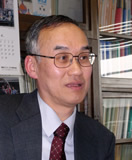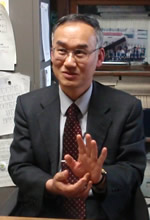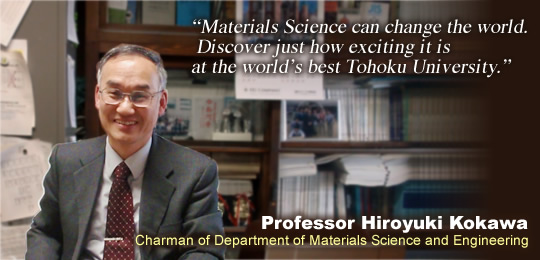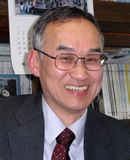Prospective Students
Message from Professor
An interview for high schools students with Professor Hiroyuki Kokawa
We asked Professor Hiroyuki Kokawa (Interface Science and Engineering of Joining) to talk about the features of Tohoku University's Department of Materials Science and Engineering program.
What are the features of Tohoku University's Department of Materials Science and Engineering program?
The Department of Materials Science and Engineering program at Tohoku University is known to be the best in the world. It boasts a long history, initially starting as Japan's first metals engineering department. According to the ranking of the yearly publication put out by the "Thesis Citation Trend", not only is Japan number one in the field of Materials Science, but has placed number one for the last three years. Although presently Japan is ranked number 3, it does not mean Japan's performance has dropped because this change is due to a new system based on a grouping of laboratories in China and Germany. According to independent agencies, Japan is still indeed number one. Due to such achievements, many excellent international students come to Tohoku University to study. If they want to study Materials Science, they choose Tohoku University.
For example, if a Japanese professional baseball player joins the American Major League, there are some who will discover that they are not as good as they first imagined themselves to be. As it goes, you won't know unless you try. But, our researchers here at Tohoku University have always been apart of the world's major league. If you are a student, and if you research well, you will be known throughout the world - if you have the ability and you study here, you will be recognized. And this is not simply because Tohoku University is famous, it is because we are directly connected with and are recognized to be top ranked in the world.
In what areas of instruction does Tohoku University's strength lie?

We are not only conscious of our research, but of our instruction as well. Lately we've been focusing largely on English. One must present as well as evaluate his or her research results in the English language. And especially since Tohoku University is recognized on the world scale, we must use our English ability accordingly. And so we employ a wide variety of ways of using English taught to us by native speaker instructors. For example, how to use English in order to write your thesis as well as how to use English used when you do international presentations. We also have lectures on TOEIC and TOEFL. For, you must provide your TOEIC and TOEFL result when you take your graduate school examinations. If you don't go to English Conversation School you will find enough means to study English here at our university. The earlier in life you begin studying language the easier it is to pick up. And it then proves to be useful from when you begin your career.
We constantly engage in exchanges with overseas universities. Approximately 30-40 first year to second year students participate with Korea's POSTECH University in our main student exchange activity program.
Also, the Department of Materials Science and Engineering program is JABEE certified. Which means that the students who graduate from our university graduate with a recognized international standard that deems them to have received a superior education to that of the standard level. We award your degree upon graduation. And one of the merits of obtaining this degree is that the student is exempted from having to take the consulting engineer qualification's first stage examination.
What is interesting about the field of Materials Science?
It is perhaps difficult to pinpoint what the word 'materials' exactly means, but it is the foundation of all manufactured products. Whatever field of engineering, there is a group of materials that plays a role.
If you manufacture something, if you try to pursue some sort of function, like a circuit is to electricity, like structure and design is to architecture, something must be devised as a means to and end. But, with materials, if its nature changes, everything from the structure and performance fundamentally changes. It is a field that can drastically change the world.
For example, lets say that the life span of a nuclear power plant is 30 years. Simply with the slight improvement of the performance of the material, it is possible for the life span to grow by 50 or even 100 years. Not only can the life span increase, the entire performance can improve. If one can improve the handling temperature by 100 degrees, energy efficiency will, in a single stroke, get better. Or possibly, the level of safety will grow. With the change of the material, in an instant a whole range of problems can be solved. And this is something only Materials Science can do. And this is what I think is so interesting about the field.
Please tell us about the feature of the university's open campus.
For high school students, the words Materials Science might not easily conjure up an image in one's mind. So, we want them to realize "just how interesting Materials Science actually is". One of the activities of our open campus is just that. In actuality, within Japan, the history of the Department of Materials Science and Engineering program's open campus is very old and has been in place long before the opening of Tohoku University as a whole. And since it was a little unusual at the time, it was picked up by the newspapers or television.
There a lot of students who are interested in and aim to join our open campus. We explain and inform about our research students, our courses, and our research. The students who attend seem to warmly watch as well as take in the sincere efforts by our older staff to introduce things as clearly as possible.
Please tell us about what happens after a student graduates from their undergraduate or graduate program?
Whatever industry, there is a need for people specializing in Materials Science. For example, I've been asked by someone who was interested in aerospace and aviation and was wondering if a connection could be made with the field of Materials Science. The answer is that, yes, a big connection can be made. Although we hear that because of the recession less job offers are being offered, there is no such worry in the field of Materials Science and Engineering. As it is important to continuously promote industrial technologies, a great many businesses are hoping to employ materials engineers from Tohoku University.
Wherever you go after graduation you will find one of the program's graduates already there. This is truly a great achievement. Plus, if you are a graduate from your predecessor's old school, you will be warmly received. Even after a student enters society, there seems to be a constant interest in Tohoku University. To almost all, undergraduate and graduate degrees are merely 4 to 6 years of one's life. But no matter how many years pass, Tohoku University is thought to be one's home.
What kind of students are you looking for? Also, what kind of things do you hope students to be conscious of studying at high school?
As a standard, rather than saying "we want this kind of student", we hope for a wide variety of students to join our university. We look highly upon curious as well as proactive students.
We hope for students to develop the habit of constantly asking themselves "why is this?". Rather than indiscriminately memorizing rules, we hope one learns to think about the fundamental principles behind why something is the way it is. Also, within the field of engineering, it is impossible to solve and implement projects solely on one's own. A student cannot progress unless he or she accepts the contribution of a wide range of other people. Which, in turn, requires someone with leadership skills. We hope for talented individuals who can get along with others and can also be a leader. And we hold this perspective during one's entrance examination. There are a lot of students who flourish after entering our university who have had the experience of bringing people together in their high school club activities or as designated members of their high school.

This is really important - not to think simply studying is enough. We'd also like one to always think of his or herself as a member of society. To have "I'm doing these kind of studies because it will be useful in the society" in your conscience is very important. We hope for not only the person to hold this basic way of thinking, but to hold it in regard to others around you. Although engineering ethics are being held in high regard these days, on the contrary, there are many dangerous cases of when people who, although conscious of such morals, mistake the way to use them. After all, engineering is a craft to be used for society by creating happiness in the individual. I think that if you think about this basic rule while you endeavor to study, perhaps, your perspective will grow by leaps and bounds. I hope the fundamental base for your studies to be: "for the people, for society".
Saying that, we of course hope for students to enjoy their university life. Although there will be times of difficulties with one's research and education, but on a basic level, we hope for one to come here with the spirit of expectation as well as hoping to do what he or she has always wanted to do. Because materials are found everywhere, one has more choices than other subjects of study. Together, lets create the atmosphere of being able to achieve one's aspirations.
2009, April



